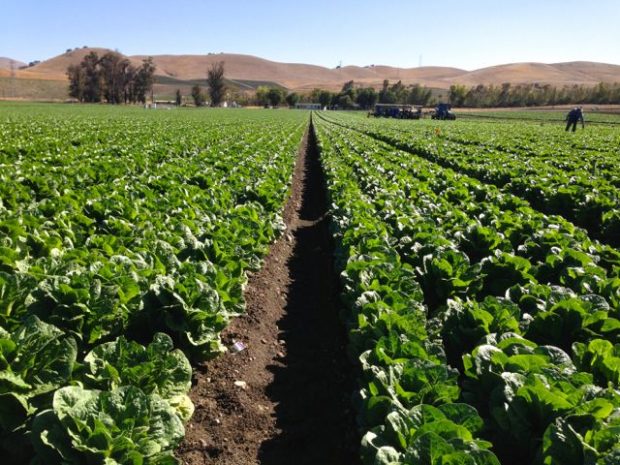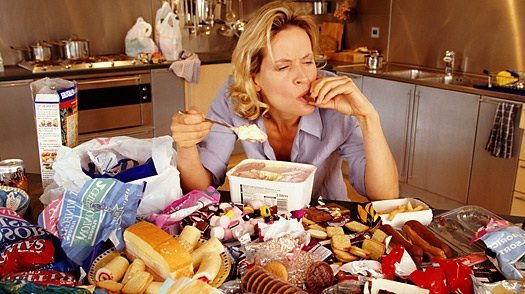The other day as I was buying a latte at a local coffee stand, I asked if they offered organic milk. After saying no, the employee started ranting about how “organic is a lie” and how there’s no such thing as organic milk “unless you have your own cow and drink raw milk straight from the udder.” He went on to say that organic food has more chemicals in it than regular, and that the only thing different about organic food is that it costs more.
Oy!
I didn’t say much in response, since it was clear he had some strong opinions that I wasn’t going to change. But it did get me thinking about how often I hear false “facts” about organic food from people who, eh-hem, don’t really know what they’re talking about.
I’m guessing you’ve probably heard the same thing, or perhaps even read arguments that make you question whether organic is legitimate or not. So I wanted to devote a post to this topic to help clear some things up.

James Burkholder, Organic Dairy Farmer for Organic Valley, with his children
Why should you trust what I have to say about organic? For a few reasons:
- I have a Master’s Degree in Food Policy and Applied Nutrition – which means I studied our country’s food laws, regulations and labels, as well as the enforcement of these institutions, for three years.
- I’ve visited countless farms, both organic and conventional. And anyone who has done so has seen marked differences with their own eyes.
- I know farmers, both conventional and organic. They can tell you exactly what they are/are not allowed to do in organic or conventional farming.
- I will always do my best to provide you with scientifically proven information you can trust.

At Earthbound Farm headquarters with The Curvy Carrot
4 Myths About Organic Food
Myth #1: Organic food is no healthier than conventional.
Would you consider toxic chemicals “healthy?” Probably not. So while there may not be a significant nutrient difference between organic and conventional food, there is certainly a difference in how many chemicals you’re ingesting when you eat one or the other. A couple specific examples:
- 45 pesticides, 16 of which are known hormone disruptors, were found on ONE sample of strawberries, according to USDA Pesticide Data Program reports, 2009.
- Organophosphates (among the most common and most toxic insecticides used today) are thought to impair children’s brain development, reduce male fertility and may be linked to leukemia and lymphoma (source). Eating organic greatly reduces exposure to organophosphates.
Myth #2: Organic produce has more pesticides than conventional.
Wrong. In fact, the naturally-derived pesticides that are allowed in organic farming are sometimes so ineffective that farmers don’t even find them worthwhile to use. So organic farmers take a different approach: they work with the land, plants and “good” bugs to protect their crops, instead of trying to combat pests, weeds and fungi with chemicals.
A 2015 study showed that people who “often or always” buy organic produce had significantly less toxic insecticides in their urine, even though they reported eating 70% more produce than people who “rarely or never” buy organic.
Myth #3: Organic food and conventional food are not that different.
For starters, here are 4 things that are by definition not allowed in organic food:
- Toxic, persistent pesticides.
- GMOs (genetically modified organisms).
- Antibiotics.
- Artificial growth hormones.
All of these are permitted in conventional farming, as are many other things that might surprise you (like sewage sludge and irradiation).
As for enforcement of organic standards? Organic is the most highly regulated food label.
Myth #4: Big organic companies are not as “organic” as small organic farmers.
When an organic company or farm grows and develops more resources, its farming and production methods may actually become more efficient, more sustainable, and safer for consumers. Large scale production can also reduce costs and improve distribution, so more people have access to affordable organic food. Lastly, let’s not forget that big organic companies used to be small organic farmers, who only grew because of our purchases and long-term support!








22 Comments
Nichole
May 1, 2015 at 6:50 amAhhhhhh! What a breath of fresh air! Thank you for the great post!
Have you seen the documentary “In Organic We Trust”? I thought it was a great, unbiased, factual look at the organic industry.
Holly
May 1, 2015 at 7:44 amHey Amelia, great post! I’ve been meaning to ask you this question. I heard someone say that Clover milk is all organic, but they only label half of it organic bc it’s too expensive to label all of it organic. Why would that be the case? Or is that just another myth?
Amelia Winslow
May 1, 2015 at 9:18 amI haven’t seen that, Nicole, but now I can’t wait to check it out! Thanks for the rec!
Amelia Winslow
May 1, 2015 at 9:22 amLike many big brands, Clover offers both an organic and a conventional product. So “Clover Stornetta” is their conventional milk and Clover Organic is their organic milk. The organic milk comes from cows raised on organic land who eat organic feed, whereas Clover’s other cows eat would conventional feed. As far as what you heard about the labels, that’s a myth. Hope that helps, Holly!
Rebecca @ Strength and Sunshine
May 1, 2015 at 10:09 amMy biggest focus is on GMOs, so when I can buy organic I do, but of course that still isn’t always possible.
Amelia Winslow
May 1, 2015 at 10:20 amYou bring up a good point, Rebecca. Many people are focused on GMOs these days, and there are only 2 ways to avoid them in the U.S: 1) buy organic and 2) buy Non-GMO Verified.
Buying organic also helps reduce the GMOs in our food system altogether, since the more organic land there is, the less GMOs there will be.
Jessica @ Nutritioulicious
May 1, 2015 at 11:11 amthis is by no means my area of expertise, so I appreciate you sharing this post and the sources you included. When people ask me about organic I generally tell them that if they can afford it for things like milk, meat, and the dirty dozen fruits and vegetables, then by all means they should do it. But an organic cookie is still a cookie and should be consumed in moderation
Madie
May 1, 2015 at 11:59 amThank you for this informative article!
Colorado Gal
May 1, 2015 at 12:51 pmGreat post. We’ve been trying to make a switch to organic whenever possible but with the higher cost, it can get tricky…but then we also realize that the only way to change that is by financially supporting it. Such a catch 22!
rachel
May 1, 2015 at 2:50 pmThanks for sharing! I learned a few things! 🙂
Susan
May 1, 2015 at 9:16 pmWhat a wonderful article!
Amelia Winslow
May 1, 2015 at 10:03 pmYou’re right – Organic food definitely costs more in most categories (especially meat, dairy, eggs). But I’ve found that meal planning and reducing one’s household food waste can really help offset this extra cost. Americans waste about 40% of the food we buy – so most of us could afford a lot more organic and high quality food if we were more efficient with what we bought. At least food for thought, right? 🙂
Amelia Winslow
May 1, 2015 at 10:11 pmGreat point, Jessica. Organic cookies, cake, chips, packaged snacks, etc. are still just empty calories. However, when I do indulge in foods like these, I choose organic so that I’m not taking in extra chemicals along with the extra calories!
Anna
May 2, 2015 at 5:05 pmThis is an excellent post, Amelia! Unfortunately, I do hear many people being skeptical about organics and that really bothers me when I also studied food laws and regulations for my MPH degree.
Alisa @ Go Dairy Free
May 4, 2015 at 1:03 pmI love this post – I keep hearing the “organic farmers use tons of pesticides” argument and that’s never made sense to me. Also, very good to know that big organic farms can be just as good or in some cases better. I’d been a bit concerned about this.
Amelia Winslow
May 4, 2015 at 5:40 pmI’m glad this helped reassure you, Alisa. So many rumors out there!
shelley hudson
May 6, 2015 at 12:06 amThank you for this! Although you’ve written about this topic before (and I’ve forwarded many posts on this from you!), I appreciate that it’s important enough to reiterate. I’m also glad you included your qualifications to strengthen your argument–I know it’s difficult sometimes to discern the source of info on the internet. Your integrity and passion always shine through!
Amelia Winslow
May 6, 2015 at 10:47 pmThank you, Shelley, for your loyalty and feedback!!
Saz
May 17, 2015 at 9:44 pmThanks for sharing a nice post.
Julie
May 22, 2015 at 10:52 pmFirst time here and I love the design of the blog!
Amelia Winslow
May 26, 2015 at 10:19 amThanks, Julie! Welcome!
Matchaccino
October 8, 2015 at 5:16 amThis is an eye opener to everyone especially to people who does not understand how organic products are made.